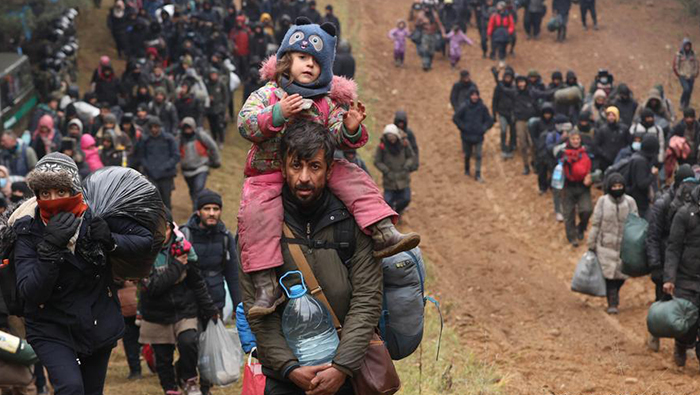
Kyiv: Heated discussions in Kyiv have been sparked after a German lawmaker suggested Ukraine could take in migrants and refugees stuck on the Poland-Belarus border, while the EU processes their asylum applications.
As yet, however, neither Berlin nor Brussels have formally proposed the idea to Ukraine's leadership.
The suggestion, made by German parliamentarian Nils Schmid of the center-left Social Democrats (SPD), is not a new one.
Several weeks ago, the head of the European Stability Initiative (ESI), Gerald Knaus, floated a similar idea during an interview with German public broadcaster rbb. The ESI think tank is credited with coming up with the idea for the 2016 EU-Turkey migration deal, which obliges the latter to take in migrants whose asylum applications have been rejected by the EU. In return, Brussels agreed to pay Turkey a total of €6 billion ($6.8 billion) to assist in accommodating migrants.
Knaus thinks a similar mechanism could be applied to deal with those who are currently attempting to cross into the EU from Belarus. He doubts, however, that Belarus strongman Alexander Lukashenko would be open to any negotiations on such a measure.
"But one might be able to reach an agreement with an eastern European democracy that looks toward Europe and would be willing to shelter these people humanely — for instance, Moldova, Georgia or Ukraine," says Knaus.
Kyiv's reaction has been lukewarm at best. Ukraine's Secretary of the National Security and Defense Council, Oleksiy Danilov, recently asked: "Out of what fear would make us take these people in?"
Talking to DW, presidential advisor Mykhailo Podolyak voiced similar skepticism, saying Ukraine disagrees with the proposed migrant deal.
Podolyak dismissed the idea as "disrespectful towards migrants and Europeans," saying individuals in Belarus seeking safety should not be treated like "objects that can be transferred from one place to another for political purposes."
Podolyak also said the Belarus-Poland border crisis was created by allowing migrants and asylum-seekers to reach Belarus via airplane or by crossing through Russia. As such, it would be logical for Germany to ask for Russia's help in resolving the situation given that "Germany and Russia have been partners for many years."
If Moscow refuses to help, he added, Germany should seize the opportunity to "take a serious look at Russia's stance on Europe."
Mainstream society skeptical of asylum-seekers
Pavlo Kravchuk, a migration expert with Ukrainian human rights organization Europe without Barriers, doubts Kyiv will sign off on any such deal — not even if Brussels promises to provide funds for sheltering asylum-seekers.
"No politician heeding public opinion [in Ukraine] would do that," he told DW. He said a migrant deal of this kind would most likely not be supported by most Ukrainians. Moreover, he said, there have been several attacks on Ukrainian refugee shelters in the past.
In 2016, the creation of a temporary refugee shelter in Yahotyn, near Kyiv, was accompanied by months-long protests by local residents as well as members of right-wing extremist organizations. Demonstrators demanded that authorities should give priority to housing war veterans and internally displaced persons from conflict-torn areas in eastern Ukraine.
Ultimately, however, the temporary shelter was opened to refugees from abroad.
Ukrainian authorities sometimes spend years assessing whether individuals qualify for refugee status or are entitled to protection. Those who are recognised as refugees may struggle to find a place to live or a job, says Kravchuk.
Many have a difficult time learning the local language, getting into the education system and acquiring healthcare. Kravchuk says traveling abroad can also present a problem, as many states do not recognize Ukrainian-issued refugee paperwork.
Asylum-seekers can be housed in temporary refugee shelters, according to the State Migration Service of Ukraine (SMS). Ukraine has four of these shelters, with a total capacity for 420 individuals.
Figures by the UN Refugee Agency UNHCR in Ukraine show that 2,255 recognized refugees and persons in need of additional protection were based in the country as of January 1, 2021.